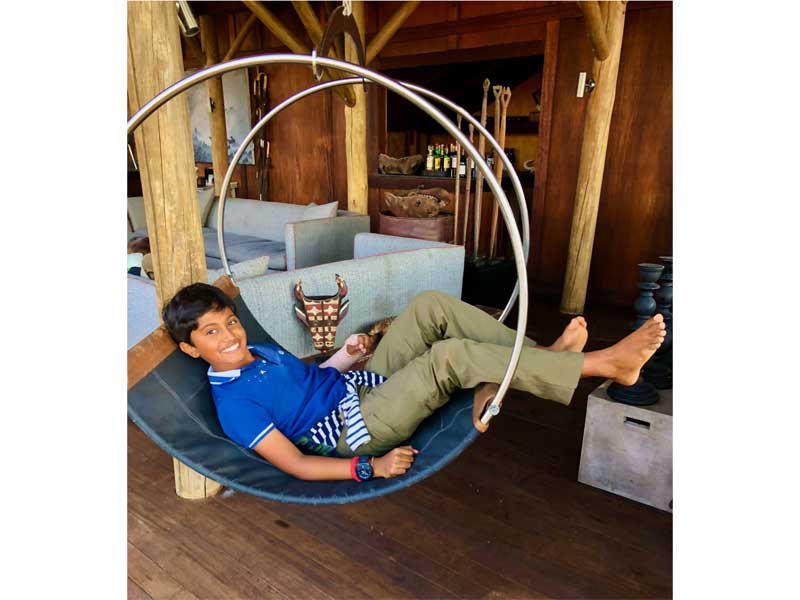
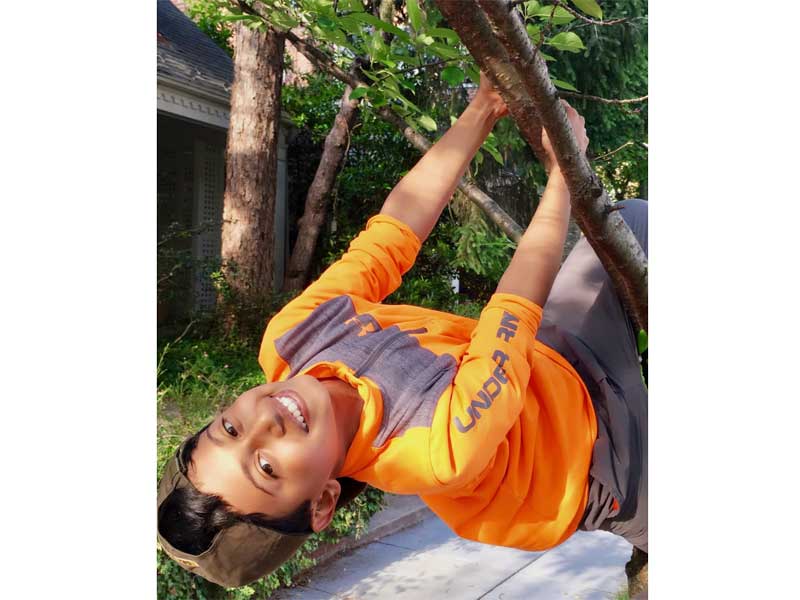
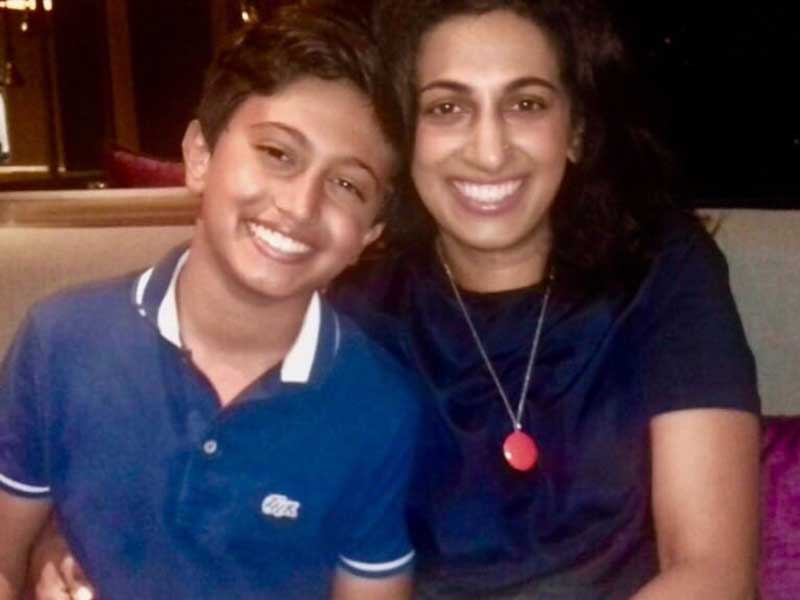
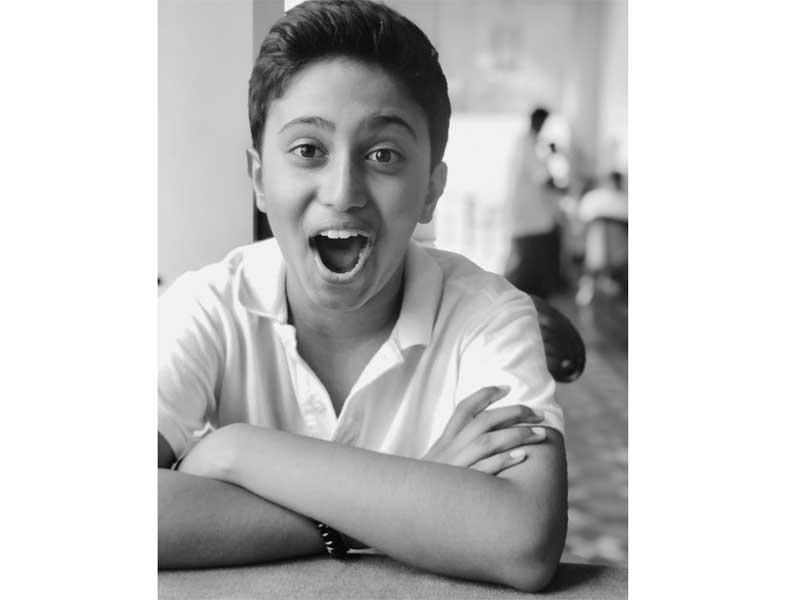
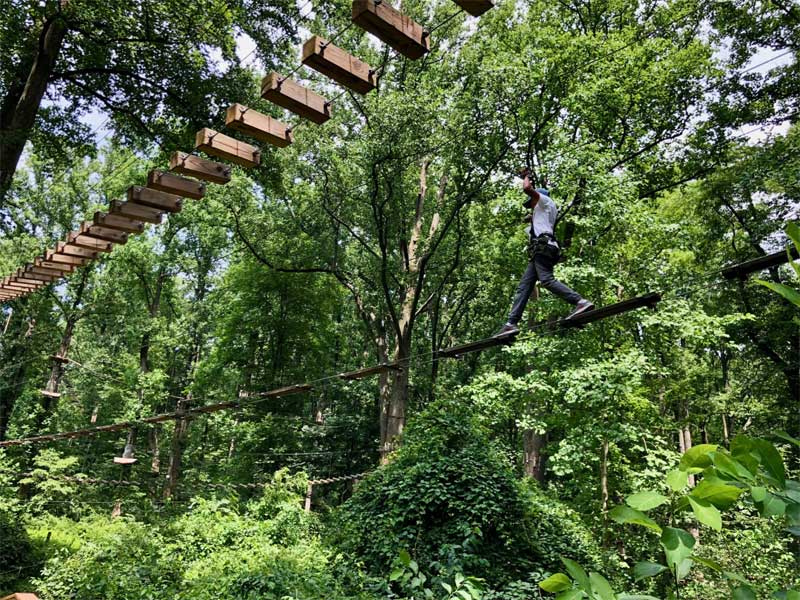
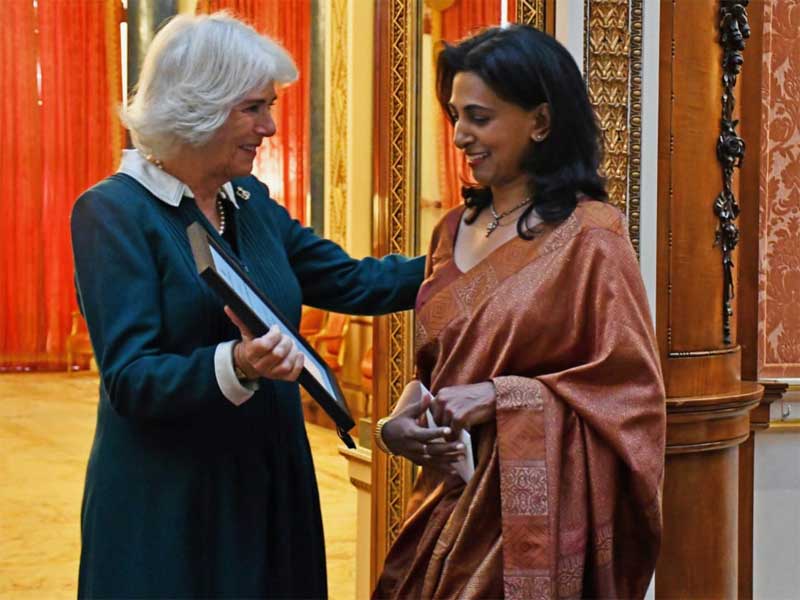
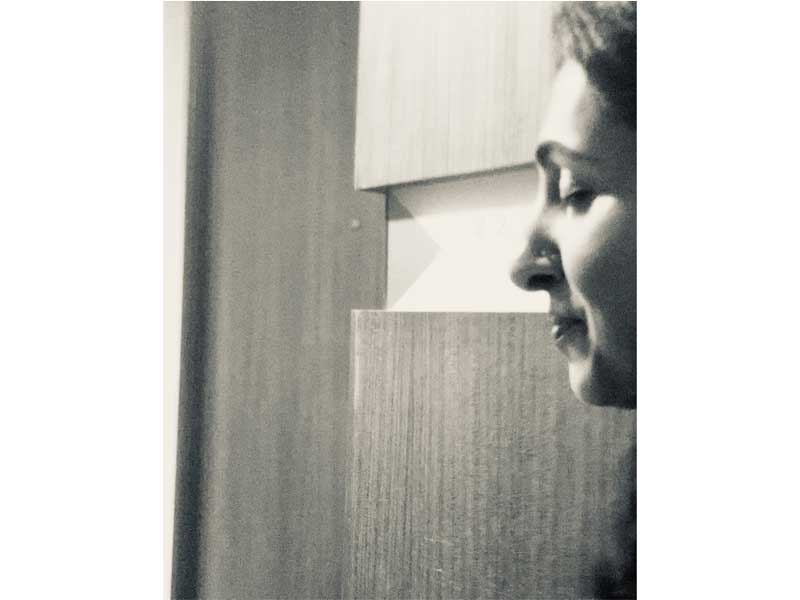
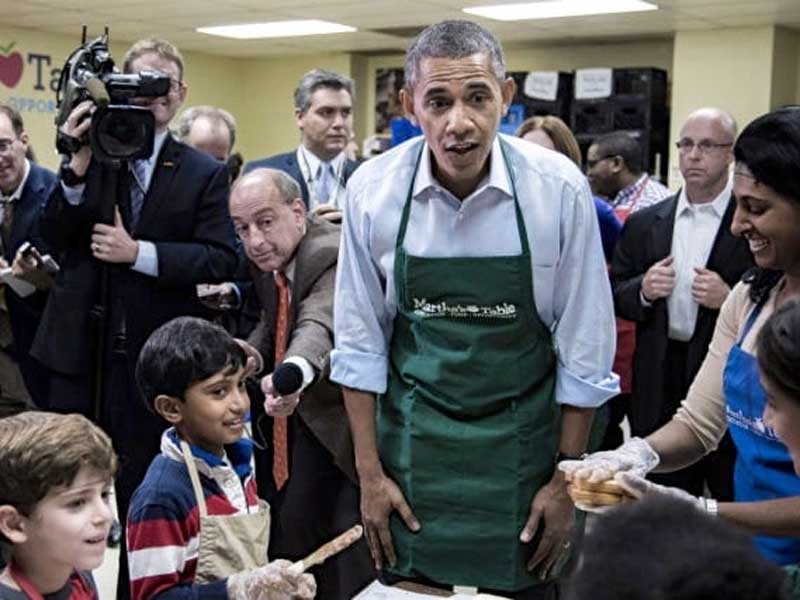
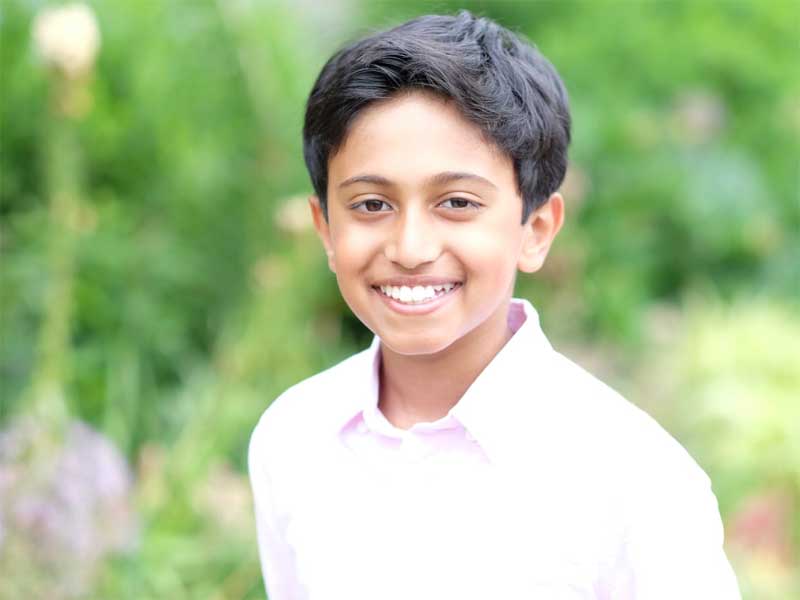
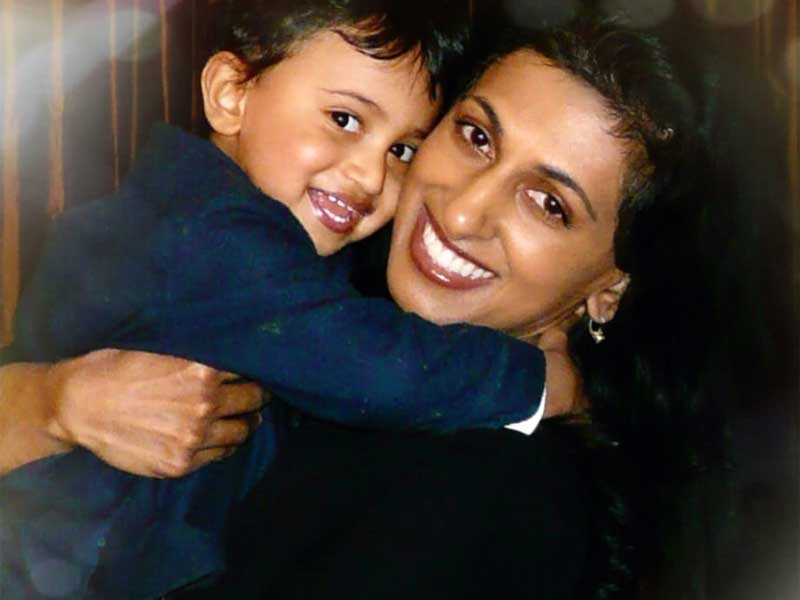
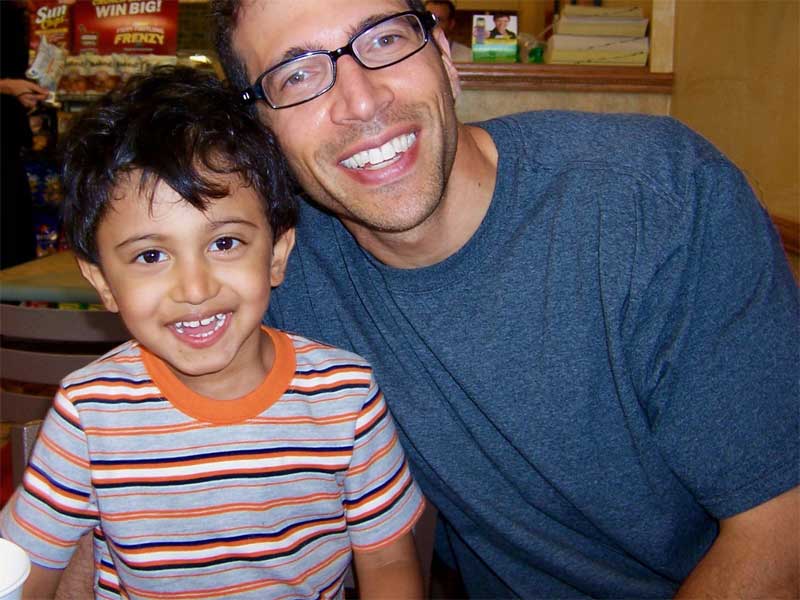
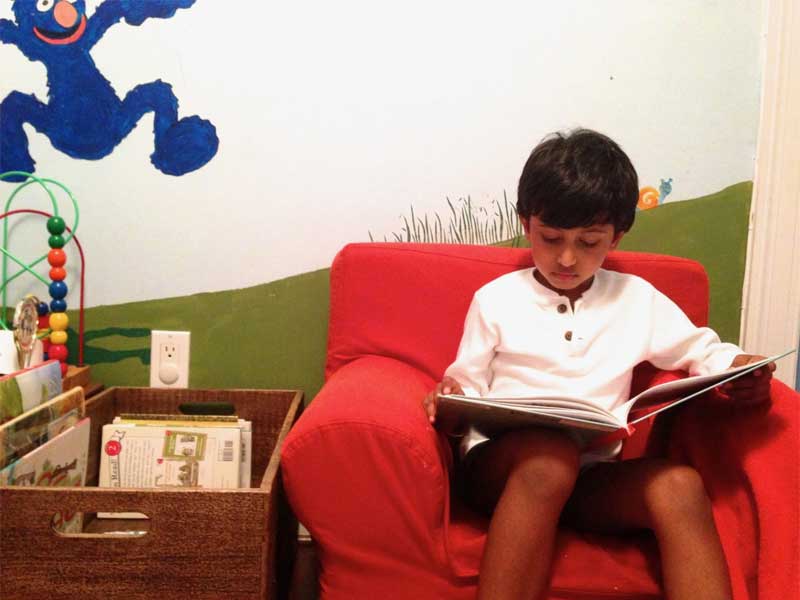
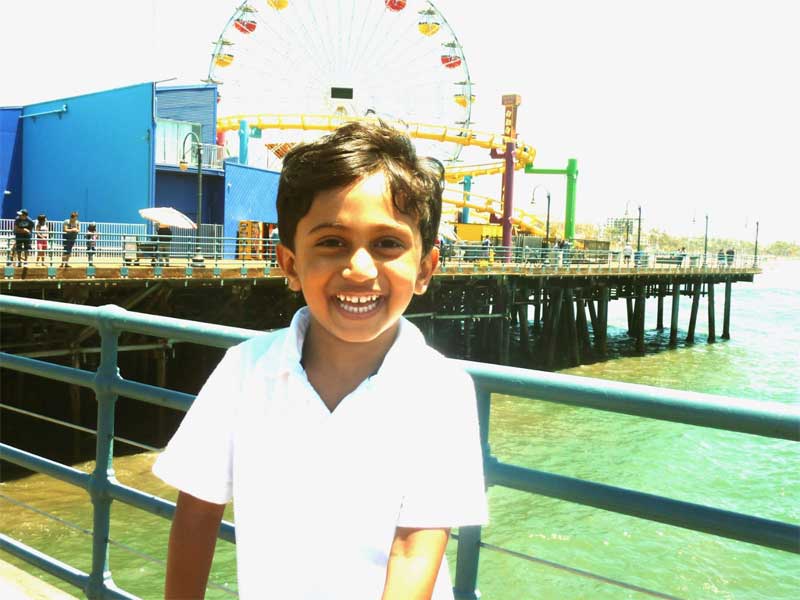
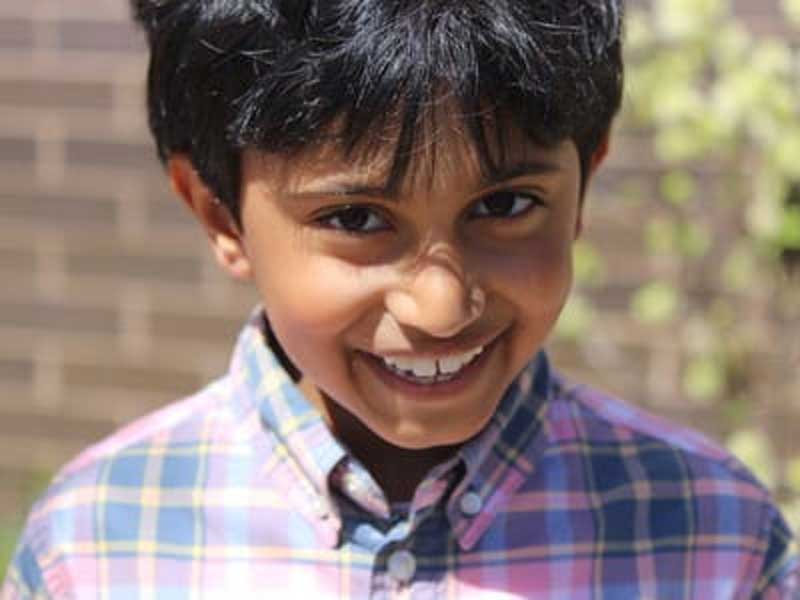
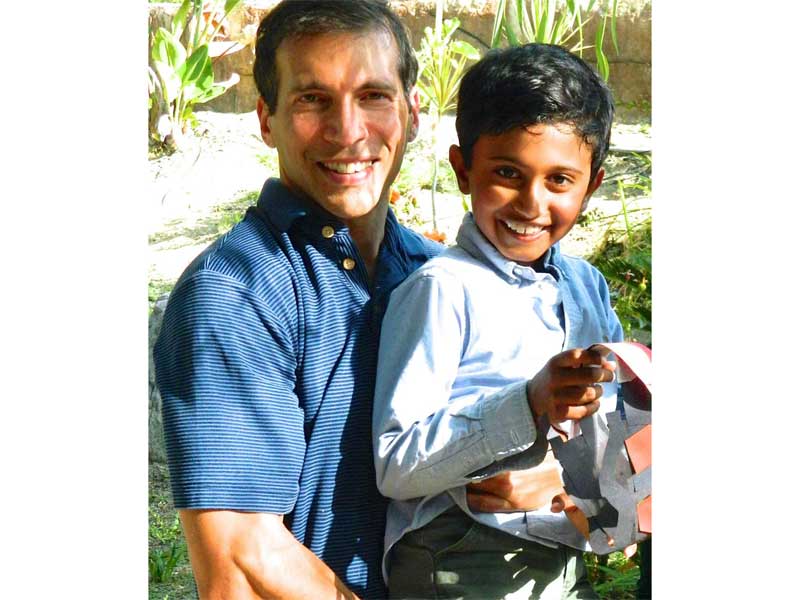

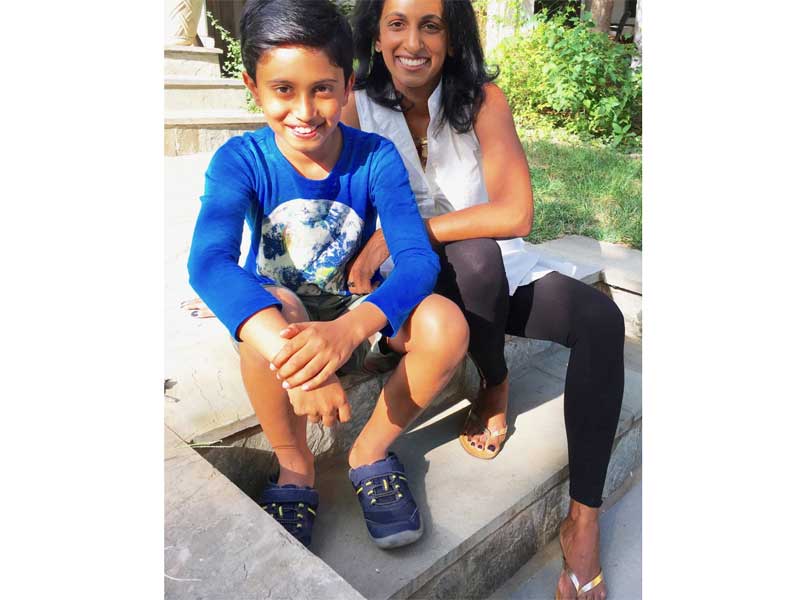
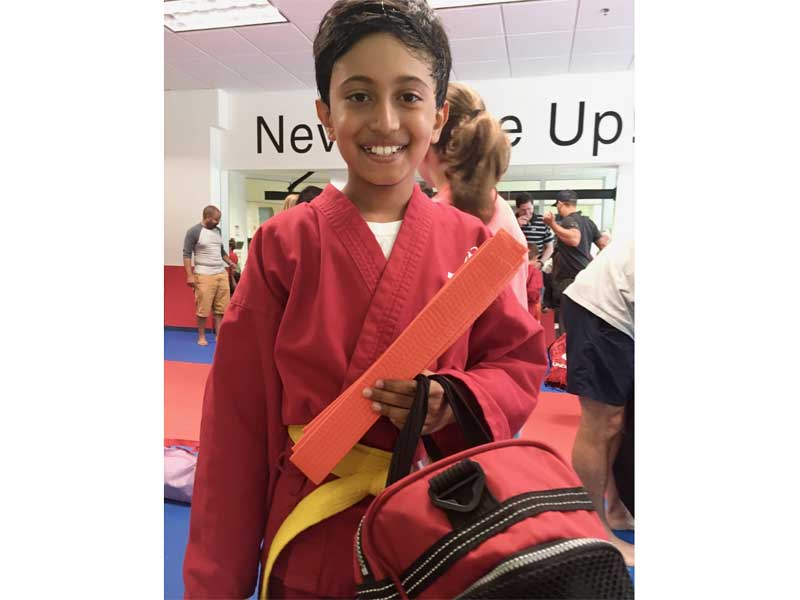
Four years ago, hundreds of people died when a series of bombs exploded across Sri Lanka on Easter Sunday. Concerted calls for justice by the surviving victims remain unheeded. In this interview published in 2022, Dhulsini De Zoysa who survived the attack, but lost her precious son Kieran speaks to Deputy Editor Tina Edward Gunawardhana of her experience in dealing with loss, grief and her hope for justice.
Felled in the prime of his life, Kieran was 11 when he became a victim of the Easter bombings in 2019. Born in the US, Kieran was destined for a great future. In an exclusive interview, his mother Dhulsini De Zoysa speaks to Features Editor Tina Edward Gunawardhana about dealing with grief and loss while issuing a call for justice.
As people across the length and breadth of Sri Lanka were preparing to celebrate Easter Sunday in April 2019, a series of bombs ripped out the very heart and soul of Sri Lanka. Bombs exploded in Negombo, Colombo and Batticaloa in churches and hotels killing hundreds and maiming thousands. The devastation wreaked by a few with skewed religious and political ideology destroyed thousands of families not only in Sri Lanka but across the world. From London and Norway to California, Singapore and Australia, families lost their precious loved ones in the horrendous Easter attacks.
Dhulsini de Zoysa, a Sri Lankan American was spending 18 months in Colombo with her 11 year old son Kieran Shafritz de Zoysa. While partaking in breakfast at the Cinnamon Grand Hotel in Colombo with her son and mother, Dhulsini’s world crashed around her in one split second when a suicide bomber detonated a backpack filled with explosives.
Although Kieran’s face and body were devoid of injuries, he was haemorrhaging internally. Dhulsini was willing Kieran to survive the attack as doctors battled for 90 minutes to save his life. Sadly, they were unable to save Kieran, who was placed on a life support machine.
That evening, almost 12 hours later, Dhulsini and Kieran’s father Alex who was at home in California made the harrowing decision to remove their only child from the life support machine.
Having watched Dhulsini from afar over the last three years, her social media posts revolve around her precious son Kieran. In a BBC interview Dhulsini spoke with clarity and calmness. She displayed an immense sense of bravery when she spoke about her unfathomable loss.
After much coaxing Dhulsini has agreed to give Hi!! Magazine an interview. Her words on her personal journey are like a soothing balm for other parents, especially mothers who are still grieving. An example of bravery and compassion tempered with a firm call for justice, Dhulsini’s story is all encompassing as she speaks about her son, his legacy, dealing with grief and most importantly urges people to seek justice and hold those in authority accountable.
Three years since the Easter bombings, there is still no end to the matter. There have been several commissions of enquiry but no tangible results. It is claimed that those in authority knew about the impending attack but kept mum.
Not a single person responsible has been brought to justice. For Dhulsini that stings. A fiercely private person Dhulsini’s fervent wish is that her story will move those in places that matter to expedite the wheels of justice and to inspire others to put pressure on the authorities to act now instead of procrastinating.
Explaining why she mustered up her courage to lay bare her feelings in this interview, Dhulsini is searingly honest when she says “you know I struggled with whether or not to give this interview and nearly backed out a few times. Then I realized that your readers are just like me: many of them are mothers who love their kids just as fiercely as I love Kieran. Mothers’ hearts break when our children are hurt. Yet, for too long, women’s voices have been silent on issues of politics and governance.”
In her effort to seek answers, justice and above all accountability from those who allowed this carnage to happen she issues a clarion call “your readers can use their voices to demand justice for the Easter Sunday victims better than I ever can. They can get involved in politics and call for progressive policies that protect Sri Lanka’s natural beauty, its wildlife, rivers, lakes, and forests for generations to come. And above all, they can commit to making this world worthy of all of our children.”
Speaking on the gamut of emotions Dhulsini experienced she says “losing my sweet Kieran, I lost my light and my faith. He was my whole world. I spent nearly three years in a really dark place. I have cried more than I thought a person could. I felt completely untethered from the world that we know, alone and adrift in a cold universe. I could not see a way forward. He and I were inseparable in life – I have never had more fun with or laughed as much with another person. It is a loss I will never recover from. How could God or the universe take the purest soul I have ever known?”
While others would turn to religion to seek answers Dhulsini says “I found no comfort in religion. I had prayed for God to watch over Kieran and keep him safe every night of his 11 years. I relied on the prayers of people who love me to carry me when I could not pray after Easter Sunday. My mother’s church and my father’s Buddhist Vihara in Washington had no answers that made sense to me. But I wasn’t an atheist either – I believed that there must be more to life than the things that we busy ourselves with. I went inward, guided by a passion to find Kieran, to restore my faith, and to understand my soul’s journey. Some call this seeking God, some call it seeking enlightenment. Others call it the quest for self-actualization.”
Dhulsini retreated to her place of comfort, books. “I could find relief from the horrors of what I had seen on Easter Sunday while reading. I read and reread the great philosophers and thinkers, Carl Jung, Viktor Frankl, Gandhi, Solzhenitsyn, Thich Nhat Hanh, Thoreau, and many others.”
She lost interest in the symbols of status that society tells us are important. “No amount of power, money, fancy cars, clothes, purses, shoes and diamonds can mend a broken heart or bring lasting happiness, just as Likes on social media don’t bring a feeling of inner calm or confidence. I began simplifying my life, shedding material things I don’t need. It is a practice that I plan to continue for the rest of my life” she says.
Exploring her feelings the grieving mother found grace in the depths of despair. She learned to listen to her inner voice and became less dependent on other people’s opinions and advice, no matter how well meaning they are. “I learned how to say no, politely but firmly, to anything that would distract me from my focus, wrestling with questions of life and death and our soul’s journey. I want total clarity, a sense of inner peace that nothing can disturb. Anything less would be unworthy of Kieran. My grief is now mixed with gratitude. Being Kieran’s mother, loving and guiding his sweet soul, is the greatest privilege of my life.
I used to tell him that I love him more than everything and everyone in the universe put together. He loved me back completely and joyfully. What more do I need than that?”
Kieran (or Kiran) means a ray of light in Sanskrit. But Kieran was not just a ray of light. He was like a bright blazing sun that shone on everyone he came across. “Be like Kieran” was a plea made by Kieran’s dad at the funeral. Dhulsini swells with pride when she says “Kieran was such an easy child: optimistic, compassionate and kind, loving and affectionate, loyal, funny and fun-loving. From his youngest days, Kieran was remarkably loving and affectionate. As a two year-old, he eased my troubles with sweet, sloppy kisses that frequently left peanut butter and jelly on my face and clothes. Kieran remained sweetly affectionate as he grew up, even when it wasn’t cool. At age 11, Kieran would still quietly slip his hand into his grandmother’s when she was agitated. He noticed that it calmed her. That kind of emotional intelligence and sensitivity is rare. “
At age 9, Kieran wrote “The most important thing about me is that I am optimistic. I always like looking on the bright side of things. I also tell funny jokes to cheer people up. I am hilarious (in my humble opinion), artistic, truthful, awesome, diligent, and intelligent. But the most important thing about me is that I am optimistic.”
Kieran charmed everyone with kindness and enthusiasm for life. Dhulsini shares that a friend in Colombo wrote that “Kieran was an outstanding student, a role model, an enthusiastic friend and a kind soul. But what stood out to me most was his smile. His smile could do wonders. I’ve seen it happen. It can turn the worst day into your best. That was Kieran, a boy with a heart big enough for the whole world.” A classmate at the Elizabeth Moir School in Colombo, where Kieran spent the final year of his life, wrote “Kieran was the happiest person I have ever met. He always managed to cheer us up when we were feeling down.”
Kieran was an enthusiastic learner with a sharp intellect and natural curiosity. He was an avid reader who always had a book in hand, reading for hours on day beds, sunbeds, even in swimming pools! He exceled in maths and science and hoped to get a PhD in neuroscience to help unravel the mysteries of the brain. But Kieran’s intellect is not why his death is devastating.
Kieran connected with boys and girls, men and women everywhere he went. A little girl who was Kieran’s classmate from age 4 onward in Washington, DC, sent Dhulsini a letter describing Kieran’s impact on her life. She wrote “I think of Kieran often. I think about his light and his kindness and his humour. He inspires me to make the world a better place. When I think about the light in me and in others, I think of Kieran as the embodiment of that light. I have always been a shy and timid person, but your son made me more outgoing just by being around him.”
Kieran instinctively knew who needed a smile and a friendly hello, who was having a bad day, who was shy. He used his charm and his bright smile to draw them into the sunshine where he lived. “I felt braver and stronger, capable of handling any challenge, with Kieran by my side,” Dhulsini said. “Chances are that, if you knew Kieran or just crossed his path, you walked away smiling, a little bit sunnier. That was his superpower”
It is reported that Kieran lived the Quaker teaching, “Look for that of God in others.” Dr. Richard Griffith, a licensed clinical psychologist and counsellor at Kieran’s school in Washington, D.C., described Kieran this way: “Kieran seemed to be able to really ‘see you’ … his recognition of you could be as simple as him noticing a quality in you that you felt went unnoticed.”
Shedding light on this characteristic Dhulsini explains “honestly, Kieran was just born that way. He seemed to arrive with wisdom – my mother recently observed that “everything comes so easily to Kieran, it’s like he’s been here before.” In the East, where we are open to the idea of reincarnation, we might say he carried tremendous wisdom from past lives or that he was an advanced soul. In the West, researchers like Jerome Kagan, a psychology professor at Harvard, are catching up to the idea that babies seem to have a distinct personality from birth. That was certainly true for Kieran.”
Kieran never lost his sense of wonder and gratitude. Days before he was killed, Dhulsini gave Kieran a blank exercise book saying “Sweetheart, I noticed that you need a
new notebook.”
Kieran took the notebook from her and said, “mommy, thank you so much!” “It didn’t matter to Kieran that it was a tiny thing. He was genuinely grateful that I had thought of him” adds Dhulsini. Kieran knew from the start that there is enough love in the world for everyone and that he was worthy of love just the way he was. He didn’t carry the insecurities that most people do. And because of that, Dhulsini thinks he approached the world with generosity, openness, and love. “We should all be like Kieran.”
Casting her mind back to the grim day of the Easter bombing, Dhulsini regained consciousness to the sound of her own screaming. “I had no idea what had happened, only that I was on the ground bracing as huge chunks of the concrete ceiling fell on my head. The blast force had thrown me to the floor a few feet away from where I sat at breakfast. I don’t know how long I was out – maybe a minute or two. I was able to stand once the ceiling stopped falling.” That’s when she realised that something catastrophic had happened. The lights were off and hanging askew. Concrete, broken glass, water, and twisted metal were everywhere. And people were moaning or calling out for help. Dhulsini had been in the 9/11 attack in New York City but “I’d never seen anything quite like this” she says pensively.
“My white dress was covered in blood. A tourist who was having breakfast at a table nearby lay dead less than a foot away. Nearly a year later, I realised that most of the blood on my dress was hers. I turned to find Kieran slumped in his seat with a large chunk of concrete resting next to him on the couch. There was no blood on his face or shirt. I assumed he had been knocked unconscious as I had. I had no idea that a piece of shrapnel had hit him from across the room. I stepped around to cup Kieran’s face in my hands and say “bubby, open your eyes, open your eyes and look at me.” I know he heard me because his eyes fluttered before he lost consciousness.”
Dhulsini knew she needed to get Kieran and her mother out of the restaurant. She wasn’t sure if there would be another blast or fire. Walking out of the restaurant, Dhulsini called her aunt to tell her that they were going to Nawaloka Hospital.
Kieran had been on life support for almost 12 hours when Kieran’s parents had to make the agonising decision to turn off the ventilator. Dhulsini says she did what any mother would do. “I spent nearly 12 hours begging, pleading, and bartering with God and the universe to take me instead of my sweet boy.”
“Alex and I spoke several times. The doctors would not give us the most basic information, like whether they had taken Kieran to the operating theatre, or put him on a heart-lung bypass machine to keep oxygen flowing to his brain. We still don’t know. It is especially frustrating for Alex, who is a Harvard-trained surgeon. It wasn’t just a matter of intellectual curiosity for him. It is his right as a father to know what treatments were administered to his child. Roughly 11 and ½ hours after the bomb blast, with no answers coming, Alex and I asked for an EEG to see if Kieran had any brain activity. The answer was negative. Our clever, curious, gifted child was gone.” Dhulsini pauses before she adds ““Alex left the final decision to me.”
We are often told that there are stages in grief. For Dhulsini, this was not so. “It’s a misconception that there are stages of grief – bargaining, anger, denial, depression, and acceptance -- that we pass through in a linear fashion. It is anything but linear for me. Everyone who has lost someone dear to them grieves in their own way and on their own timeline. And that is their right to do. Grief for me is like drowning – a painful, solitary experience – in the depths of despair, it is impossible to call for help. Trying to run from grief is as futile as trying to outrun a tsunami.”
I also kept asking myself why would I want to live in a world that would allow the killing of innocent children like Kieran?
Dhulsini was experiencing Complex Trauma – not only did she witness and survive a terrorist attack, but she also lost her only child.
She witnessed first-hand the atrocities that men are capable of committing against their fellow men. Those are images – of blood and body parts and carnage that she will never forget. During the acute trauma, which lasted more than six months, Dhulsini could hardly sleep.
She woke every 90 minutes from nightmares that took her back to the scene of the attack. “The image of Kieran’s body, carried out of the restaurant limp like Michelangelo’s La Pieta, played on an endless loop” she adds.
Reminiscing about Kieran, Dhulsini says at age 11, he still cuddled. He slept with his beloved teddies. And more often than not, he would come to his mom’s bed during the night. Nearly three years later, Dhulsini still wakes up to check if he’s flung off the duvet or to pick up a teddy from the floor. “It’s jarring when I wake up to realize that he is not there. The loss is especially excruciating in those moments.”
“I have physical and emotional scars that won’t easily heal. I suffered a traumatic brain injury or TBI, as well as compression fractures, nerve damage on both sides, muscle tears, and permanent hearing loss from the blast. I experienced excruciating, crippling pain for about a year after the attack. I could barely move my head left or right, or look up or down due to tiny fractures in my cervical spine (neck). I could not walk without feeling jolts of nerve pain down my legs and throughout my back. I couldn’t carry any weight more than a water bottle because of the nerve damage that extended down both arms. I got through these early months with support from a loving community in Washington, DC, where I grew up.”
What of Alex? How was he dealing with the tragedy? I ask Dhulsini. “Alex was incredibly supportive and kind – he never once blamed me in anger or despair for putting Kieran in harm’s way. One can imagine that someone less decent might lash out in anger. We separated when Kieran was very young, but our mutual love of our son and deep respect for one another was what bound us together in this terrible time. Alex stepped up in a way that shows what an extraordinary choice he was as the father of my only child. Kieran would have been so proud and pleased to see us united in our love for him.”
Support also came in many forms for Dhulsini. “An American cousin who was on holiday in Italy at the time of the attack flew to Colombo and flew home with me to Washington with Kieran’s body. I could not have done it without her. Friends in Washington rallied around. They planned the funeral at the Washington National Cathedral. They scheduled and drove me to doctors’ appointments, cooked and delivered meals to me, visited and cried with me. One dear friend wrote down stories I shared about Kieran in a journal for me. Another friend flew across the country to cook and freeze meals for me. My best friend came back with me to Sri Lanka later in the year to make sure I would be okay. Other friends kept tabs on me via WhatsApp, sounding an alarm if they had not heard from me in a few hours. It was a tremendous web of love.”
Counselling was another method that Dhulsini engaged in. Her trauma counsellor, who she began seeing a few months after Kieran was killed, continues to be a lifeline for her. “I could not have survived the period of acute trauma, when the emotional and physical pain were overwhelming, without her. I believe that only a therapist experienced in dealing with the really ugly side of life – like violent crimes, war, vehicle accidents, and suicides—can properly guide someone experiencing the tragic loss of a child.
My trauma counsellor helped me to cut through the noise and stay focused on the things that matter most – strengthening my connection to Kieran, so that he can live on through me.” Many of Kieran’s closest friends, in the United States and in Sri Lanka, who were children just 11 or 12 years old when he was killed, have seen therapists. Dhulsini does not believe that there is any other healthy way for young children to cope with the senseless loss of a friend and to move forward feeling safe in the world.
In Sri Lanka counselling is anathema to many but for Dhulsini it was a help. “Well-meaning family and friends are not professionals. They share their opinions, which can be extremely hurtful. Days after Kieran as killed, family and friends were quick to try to “fix” the problem. They told me that I MUST start a foundation, adopt a child, write a book, travel the world, or whatever else they thought would lessen my heartache. I heard many times that it was God’s will – one aunt even suggested that God took Kieran because I loved him too much. The God I pray to isn’t vindictive like that. Others suggested it was Kieran’s or my fate. One person even suggested that evil eye could have contributed to Kieran’s death.”
It was Alex who quite rightly said, “Dhulsini, I don’t know why you listen to these mystical explanations. We know exactly who killed Kieran and who allowed it to happen. What we don’t know is why.”
Of course, there were friends and family who fell away as well. She lost a few people who were very close to her heart – which compounded the pain. “One said “I cannot bear to think of you in pain… I cannot get the sound of your crying out of my head.” Some were unable to bear witness to my pain or to put their own issues aside to support me. You don’t know who your real friends are until you suffer loss.
Ultimately, it is Kieran’s pure and unconditional love for me that saved me. I could feel his love lifting me up in my darkest moments. Kieran was my sun, my moon, and all my stars. He continues to be my guiding light.”
Speaking about the importance of the grieving process Dhulsini says “Parents who have suffered the unexpected, traumatic loss of a child cannot hide their anguish. There is no stoic front for this kind of pain. The loss of a child is out of the natural order of things, it is like nothing else. In a BBC interview, one mother captured it perfectly when she said in Sinhala that her son and daughter died once but she dies every day. You can try to outrun grief but it will eventually catch up to you. There is a wonderful book, The Body Keeps the Score: The Brain, Mind and Body in the Healing of Trauma, by Bessel van der Kolk that documents the effect that emotional trauma has on the physical body. Neither Alex nor I turned to alcohol or drugs, not even antidepressants, in our grief. This approach may not be right for others but it works for us. I do not want to numb the pain. Why should I? This suffering is completely expected given the terrible tragedy of Kieran’s death.”
I talk to her about Sonali Deraniyagala and her book The Wave. Would she find it a cathartic experience to write about her own loss? “Plenty of friends have suggested that I write a book or take on a similarly significant project. They are well meaning but they cannot possibly understand what a struggle it is just to get through the day. Sonali, who got in touch early on to offer support, is a gifted writer and thinker.”
Dhulsini says she cannot commit to ambitious projects at this point as she is just regaining her physical strength three years after surviving a terrorist attack. She spent the first year in acute trauma and shock. She was in crippling physical pain and could not exercise or even walk without pain. Physiotherapy didn’t provide relief. All Dhulsini could do was sit on the couch at home in Washington, stuck in a very dark place.
Not only did Dhulsini suffer mentally but the explosion had caused her body physical damage. She gradually began walking when Washington DC went into lockdown in late March 2020. Walking gave her time to talk to Kieran and cry and think and pray and rage against the unfairness of it all. Dhulsini noticed that the endorphins were helping lift her mood. But she was still not able to carry any weight – even carrying a purse would cause pain to radiate up and down her body.
In late 2020 back in Colombo, Dhulsini found refuge in the gym of her mother’s condo. She began a simple strength training routine using the lightest of weights to regain strength and relieve stress. Over the next six months, the gym’s trainer expertly coached her, gradually challenging her to do more. Over time, she knew that she would not need spinal surgery as doctors had suggested early on. She found that the nerve pain was less severe and her range of motion and strength were better. Her physiotherapist in Washington could not believe her physical transformation over the course of the year that she worked with the personal trainer in Colombo.
Just as Dhulsini was regaining strength and movement, she developed other physical ailments, the result of bottling up extreme stress. “You see, in Colombo with my mother, I have to put on a cheerful front. My mother doesn’t remember the terrorist attack or that she lost her only precious grandchild. Thankfully, dementia is protecting her from remembering the trauma of that day. But the stress of keeping my son’s death from my mother is taking a toll on my health. Who knows what comes next for me? There’s a Japanese Haiku I like that says, “I have always known that at last I would take this road, but yesterday I did not know that it would be today.” I know I can’t go wrong as long as I make choices that bring me closer to Kieran.”
When Kieran was a student at Elizabeth Moir school in Colombo, he chose to write about his experience living in Sri Lanka in an essay titled My Cultural Connections during a two-hour final exam for his Form 1 English class. It was his last piece of written work before he was killed. His teacher submitted his essay to the Queen’s 2019 Royal Commonwealth Society essay competition.
Kieran wrote: “I feel like I belong in Sri Lanka. I now have a dark brown tan and my mother says that she cannot pick me out of a crowd of my friends walking out of school, laughing and messing each other’s hair. I have made a lot of friends after just one year here. It feels like I have been here much longer. No one can tell just by looking at me that I was born ten thousand miles away, that I spent the first 10 years of my life in the U.S., or that I am biracial… I am one-quarter Sinhalese, one-quarter Tamil, three-eighths Russian, and one-eighth German. My family is Buddhist, Christian, Quaker, and Jewish. We celebrate peraharas and poya days, Christmas, and Hanukkah… I am what they call in Sri Lanka a real “achcharu”, or pickle, made up of many different ingredients and spices… But, right now in Colombo, I am #sosrilankan.
This essay earned Kieran the Junior Runner Up Prize in the Queen’s Commonwealth Essay Competition. Dhulsini attended the awards ceremony held in 2019 at Buckingham Palace to pick up the award on behalf of Kieran from The Duchess of Cornwall. It was a bittersweet day for Dhulsini. The celebration at Buckingham Palace was just six months after Kieran was killed. “My sweet Kieran will never graduate from school or university, never pursue his career aspirations, never marry or have children. This was it. Alex had work commitments in the U.S. that prevented him from attending. The trip was very emotional for me.”
“Having grown up in the U.S., I am not a royalist by any measure but the sheer splendour and history of the palace is awesome.
I remembered an old black and white photo that my father had saved of his parents attending the knighting of a great uncle at the palace in the 1950s. How proud my father would have been of Kieran. Why should I not admit it? My heart was breaking. I was trembling on the podium as a Scottish novelist read Kieran’s essay for palace guests. Her Royal Highness the Duchess of Cornwall was lovely. She kept her hand firmly on my back steadying me. Looking out at the audience of 200 or so guests, I saw that many were crying as they listened to Kieran’s words. When the reader finished, the crowd gave Kieran a standing ovation. The applause was thunderous, so loud I’m sure it was heard in the heavens.”
At the conclusion of the ceremony, a crowd formed around Dhulsini eager to express their condolences or share stories of their own loss and heartbreak. “Former Spice Girl Gerri Halliwell embraced me with tears in her eyes, explaining that she has only one young son and that she doesn’t know what she would do if something happened to her boy. HRH The Duchess of Cornwall later wrote to me expressing her support – I was not expecting such kindness. Everyone was so supportive and encouraging.”
Dhulsini subscribes to the notion shared by Gerri Halliwell at the awards ceremony when she said that Kirean will “live on” through his words. “Children are the focus of our efforts. Marion Wright Edelman, the American activist who founded the Children’s Defense Fund, said “if we don’t stand up for children, then we don’t stand for much.” I want to help students to grow into thoughtful, responsible, and ethical citizens of the planet, like Kieran.”
At his school in Washington, D.C. Dhulsini has established the Kieran Shafritz de Zoysa ’Memorial Fund for Global Studies to foster in Sidwell Friends School students Kieran’s innate curiosity about the world around him. The fund supports a social studies programme that weaves the study of geography, history, economics, and environmental conservation across countries and cultures that American students may otherwise overlook. At a girls’ school in Tanzania, Dhulsini is hoping to prepare students from remote villages who do not have access to English language school for Advanced Level studies and university. In Colombo, she is supporting the Elizabeth Moir School, where Kieran studied for one year, with scholarships to give students a world class education. “I hope that new leaders will emerge from Kieran’s generation all over the world, leaders who will not divide us for their benefit, who will protect freedom of speech and journalistic integrity, who will honour religious differences, who will respect the courts, and who will not hold themselves above the law.”
Like every person who lost family in the Easter bombings, Dhulsini and Alex find the wheels of justice are moving at an excruciatingly slow pace in Sri Lanka. As parents they both feel it is important to add their voices to the calls for accountability and justice and in 2019 they filed a Fundamental Rights Petition at the Supreme Court of Sri Lanka.
Explaining their actions Dhulsini says “we brought the Fundamental Rights for Kieran, to say that he is important, that his life mattered. Will it bring Kieran back? Of course not – but that’s not the point.
No one from the Government of Sri Lanka, past or present, ever reached out to us to acknowledge that we lost the most precious person in our lives, our only child, or to express condolences or support. It’s a shocking disregard for the value of human life.”
“We know that there are tens of thousands for whom justice never came, no acknowledgement or accountability, no apologies, no answers to the most basic questions: what happened to my child? Who killed my husband/wife? We are not expecting swift justice. We know that “the arc of the moral universe is long, but it bends toward justice,” as Martin Luther King, Jr., reminded us. Change takes a long time. “
Dhulsini says she is aware that there are extremists in every country and of every faith who believe that violence is the answer. There will always be those whose ideology is so misguided that they are willing to kill innocent people.
However she is also a mother who is determined to see justice meted out during her lifetime. “I believe that Government bears the responsibility to protect the people and to deliver justice. Tragedies like the Easter Sunday attacks happen when Government fails its primary mission. It is unconscionable that the former Government ignored credible intelligence reports that could have prevented the Easter attacks from happening. I don’t know much about the Government I don’t know why the former president ignored intelligence reports. But I do know that there will be no justice unless the people of Sri Lanka demand better.”
Good people cannot stand by idly and say “what to do.” Good people, especially those with money and influence, must call out what is morally repugnant and say enough is enough. Martin Niemoller, a German theologian, wrote “first they came for the socialists and I did not speak out because I am not a socialist… then they came for the Jews and I did not speak out because I am not a Jew. Then they came for me and there was no one left to speak for me.”
“It is too late for my baby, but it is time to do better for all of our children: we must hold our leaders accountable whether here in Sri Lanka or in the United States or in China or in Israel or in the UK– or somewhere else. The world will only know peace when the power of love overcomes the love of power. We have to protect our earth, its oceans and wildlife, and above all, we must protect our children. More than 2000 years ago, Hillel the Elder, a Jewish scholar, said “If not us, who? If not now, when?”
Losing a child leaves an aching hole in your heart and soul. Despite the passage of time the sense of loss remains steadfast and the pain raw. Many is the time people ask Dhulsini if she has moved on to acceptance. She says “I will never accept that my only child, my precious son, was murdered – and worse yet, that the whole tragedy could have been stopped. Is Kieran’s death and my pain not enough? How many children must die, how many mothers must suffer before we commit to making this world worthy of all of our children?”
At the end of our interview Dhulsini’s parting words are stark and strike a chord. “Those who lost loved ones in the Easter Sunday attacks are not the only victims. Every Sri Lankan deserves better.”
